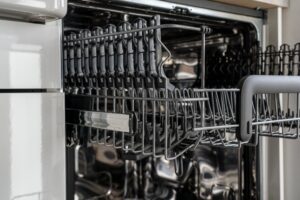Introduction
Appliances are an essential part of our daily lives, making our tasks easier and more convenient. However, like any other machine, appliances can experience problems and malfunctions. From leaking refrigerators to dishwashers that won’t start, these issues can be frustrating and disruptive. That’s why it’s important to understand how to troubleshoot and fix common appliance problems. By learning the basics of appliance repair, you can save time and money by avoiding unnecessary service calls and potentially extend the lifespan of your appliances.
Understanding Basic Appliance Components
To effectively troubleshoot and fix appliance problems, it’s important to have a basic understanding of how appliances work. Most appliances consist of several common components, including motors, heating elements, pumps, valves, and control boards. These components work together to perform specific functions within the appliance.
For example, in a refrigerator, the motor is responsible for circulating cool air throughout the unit, while the heating element in a dishwasher is used to dry the dishes. Understanding how these components work together can help you identify the source of the problem when an appliance malfunctions.
Identifying and Diagnosing Common Appliance Issues
When an appliance starts acting up, it’s important to identify and diagnose the issue before attempting any repairs. Common appliance problems include leaks, strange noises, failure to start or heat up, and electrical issues.
To diagnose the problem, start by observing the appliance’s behavior and listening for any unusual sounds. Check for any visible signs of damage or wear and tear. If possible, consult the appliance’s manual or look up troubleshooting guides online for specific models.
How to Fix a Leaking Refrigerator
A leaking refrigerator is a common problem that can lead to water damage if not addressed promptly. The first step in fixing a leaking refrigerator is to identify the source of the leak. Common causes include a clogged defrost drain, a faulty water inlet valve, or a cracked water line.
To fix a clogged defrost drain, start by unplugging the refrigerator and removing any food or shelves from the freezer. Locate the drain hole at the back of the freezer and use a pipe cleaner or a small brush to clear any debris. Flush the drain with hot water to ensure it’s clear.
If the water inlet valve is faulty, it will need to be replaced. This is a more complex repair that may require the assistance of a professional. Similarly, if the water line is cracked or damaged, it will need to be replaced.
Tips for Troubleshooting a Malfunctioning Dishwasher
A malfunctioning dishwasher can be a major inconvenience, especially if you rely on it for daily use. Common dishwasher problems include failure to start, not cleaning dishes properly, and leaks.
To troubleshoot a dishwasher that won’t start, start by checking the power supply. Ensure that the dishwasher is plugged in and that the circuit breaker hasn’t tripped. If the power supply is not the issue, check the door latch and switch to ensure they are functioning properly.
If your dishes are not getting clean, check for any clogs in the spray arms or filters. Remove any debris and clean them thoroughly. Additionally, make sure you are using the correct amount of detergent and that it is suitable for your dishwasher.
For leaks, check the door gasket for any signs of damage or wear. Replace it if necessary. Also, inspect the water inlet valve and hoses for any leaks or cracks. Tighten any loose connections or replace damaged parts.
Common Causes of a Noisy Washing Machine and How to Fix Them
A noisy washing machine can be disruptive and indicate underlying issues. Common reasons why washing machines make noise include unbalanced loads, worn-out belts or bearings, and loose parts.
To fix an unbalanced load issue, redistribute the clothes evenly in the drum. If the noise persists, check the leveling legs and adjust them as needed to ensure the machine is level.
Worn-out belts or bearings can cause a loud grinding or squealing noise. These parts will need to be replaced, which may require the assistance of a professional.
Loose parts, such as screws or bolts, can also cause noise. Inspect the machine for any loose parts and tighten them as needed. If the noise continues, it may be necessary to replace the faulty part.
Addressing Electrical Issues in Appliances
Electrical issues in appliances can be dangerous and should be addressed promptly. Common electrical problems include appliances not turning on, tripping circuit breakers, or experiencing power surges.
If an appliance is not turning on, check the power supply and ensure that it is plugged in properly. If it still doesn’t turn on, check the circuit breaker to see if it has tripped. Reset it if necessary.
If an appliance is tripping circuit breakers or experiencing power surges, it may be drawing too much power. This could be due to a faulty component or a wiring issue. In these cases, it’s best to consult a professional to avoid any potential safety hazards.
How to Fix a Gas Stove that Won’t Ignite
A gas stove that won’t ignite can be frustrating and prevent you from cooking meals. Common causes of gas stove ignition issues include a faulty igniter, a clogged burner or pilot light, or a gas supply issue.
To fix a gas stove that won’t ignite, start by checking the igniter. It should produce a spark when you turn on the burner. If there is no spark, the igniter may need to be replaced.
If the igniter is working properly but the burner or pilot light is not lighting up, check for any clogs or blockages. Clean them thoroughly and ensure that gas is flowing properly.
If the gas supply is the issue, check the gas valve to ensure it is open. If it is closed, open it and try igniting the stove again. If the issue persists, it may be necessary to consult a professional.
Troubleshooting Tips for a Microwave that Won’t Heat
A microwave that won’t heat can be frustrating, especially when you’re trying to quickly heat up a meal. Common reasons why microwaves won’t heat include a faulty magnetron, a malfunctioning high voltage diode, or a defective door switch.
To troubleshoot a microwave that won’t heat, start by checking the power supply and ensuring that it is plugged in properly. If the power supply is not the issue, check the door switch to ensure it is functioning properly. A defective door switch can prevent the microwave from heating.
If the door switch is working properly, the issue may lie with the magnetron or high voltage diode. These parts are responsible for generating and controlling the microwave’s heat. They will need to be tested and replaced if necessary, which may require the assistance of a professional.
When to Call a Professional Appliance Repair Technician
While many appliance problems can be fixed with basic troubleshooting and DIY repairs, there are instances where it’s best to call a professional appliance repair technician. Signs that it’s time to call a professional include:
– The problem persists after attempting basic troubleshooting steps.
– The repair requires specialized tools or knowledge.
– The appliance is still under warranty.
– The repair involves working with gas or electrical components.
Hiring a professional appliance repair technician has several benefits. They have the expertise and experience to diagnose and fix complex issues quickly and efficiently. They also have access to specialized tools and replacement parts, ensuring that the repair is done correctly.
Conclusion
Appliance problems can be frustrating and disruptive, but with some basic troubleshooting knowledge, many issues can be resolved without the need for professional help. By understanding the basic components of appliances and how they work together, you can effectively diagnose and fix common problems.
From fixing a leaking refrigerator to troubleshooting a malfunctioning dishwasher, addressing electrical issues, and fixing a gas stove or microwave that won’t work, there are many common appliance problems that can be resolved with some basic knowledge and DIY repairs.
Regular appliance maintenance and repair can help extend the lifespan of your appliances and save you money in the long run. By taking the time to troubleshoot and fix common issues, you can keep your appliances running smoothly and avoid unnecessary service calls.
If you’re in need of accurate appliance repair, look no further than 911 Appliance. With their team of skilled technicians and commitment to customer satisfaction, they are the go-to experts for all your appliance needs. In fact, they even offer warranties on their services to give you peace of mind. To learn more about their warranty options, check out their article on warranties. Don’t settle for subpar repairs when you can trust 911 Appliance to get the job done right.



